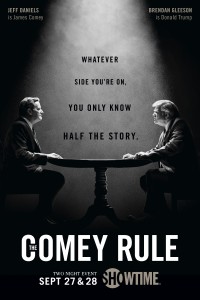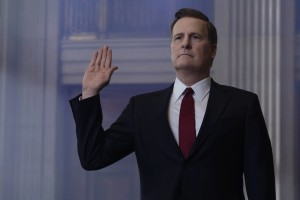
Jeff Daniels as FBI Director, James Comey in THE COMEY RULE | ©2020 CBS Television Studios/SHOWTIME/Ben Mark Holzberg
THE COMEY RULE is a two-part miniseries premiering on Showtime on Sunday, September 27, and Monday, September 28. Based on former FBI Director James Comey’s nonfiction memoir A HIGHER LOYALTY, the project is adapted for television and directed by Billy Ray.
Jeff Daniels plays Comey, who goes from being appointed as head of the FBI by then-President Obama (Kingsley Ben-Adir), to dealing with the complexities of presidential candidate Hillary Clinton’s use of unauthorized email servers, to the unorthodox expectations and demands of President-Elect Donald J. Trump (Brendan Gleeson), to the realization that there was collusion between Russian operatives and the Trump campaign.
While THE COMEY RULE paints Comey in the best possible light (it is based on his book, after all), it serves to illuminate his thinking in handling Clinton’s emails, and creates a credible and progressively horrifying portrait of the early days of the current political administration.
An Oscar nominee for his screenplay for CAPTAIN PHILLIPS, Ray also created the TV series THE LAST TYCOON (based on F. Scott Fitzgerald’s unfinished novel), and wrote and directed the features SECRET IN THEIR EYES, BREACH, and SHATTERED GLASS.
This article is derived from a Showtime Zoom conference call for THE COMEY RULE, which includes Ray, Daniels, Michael Kelly (who plays FBI Deputy Director Andrew McCabe), Jennifer Ehle (who plays Comey’s wife Patrice), Oona Chaplin (who plays FBI lawyer Lisa Page), and Steven Pasquale (as FBI agent Peter Strzok).
Ray says that his aim was to tell a good story that was also truthful. “Well, I don’t think it will do us any good to make an important story if we weren’t telling a good story. So, that’s always the priority. We are all servants to the story gods over here. We wanted to tell a story that was emotional and moving and compelling and harrowing and oddly hopeful all at once, but we wanted to tell the truth. You are always trying to accomplish both when you are doing a real story.”
However, Ray continues, what he most wanted to do was give people insight into historical events. “The biggest part for me was that everybody believed they knew what had happened in 2016. Everyone believed, whether they were watching Fox News or CNN or MSNBC or listening to Sinclair Radio, that they knew what happened. We had an opportunity to take them inside the rooms where these decisions were getting made. We had an opportunity to let them be Jim Comey for five minutes and see what they would have done given the pressures and constraints facing him. And that, to me, is the power of the story that we told, that we are going to give people a look inside the rooms that they couldn’t possibly have seen any other way.”
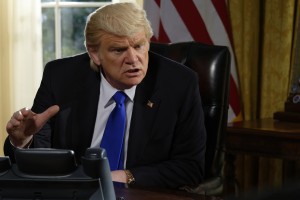
Brendan Gleeson as President Donald Trump in THE COMEY RULE | ©2020 CBS Television Studios/SHOWTIME/Ben Mark Holzberg
How much does Ray believe that the audience already knows about the events covered in THE COMEY RULE? “I think we all assume a certain political baseline for our audience, but we do explain what we think they may not know. When you’re working on something like this, with actors like these, you’re really thinking more about the emotional truth of a given moment or a given storyline than you are about educating, and I think that’s why the piece has the flow that it does and feels as compelling as it does. It sounds grandiose to say that about one’s own work, but it does seem to move people. And I think that’s because we don’t try to make it a documentary and we don’t try to stop the narrative to make sure that the audience catches up to us. We just trust that they’re going to ride the stories of these characters.”
Does telling the story from Comey’s perspective color the truth of it? Ray replies, “That’s a very fair question to raise. If Jim Comey had written and directed the movie, I think that would be much more apt, but he didn’t. I did. I used his book as a jumping‑off point, and then got on a plane, and went to D.C., and interviewed dozens of people on my own, and did lots of my own independent research, and read the reports, and met with people from the other side of the aisle, and got their perspectives, too. Director Comey was a resource. Whenever I had a question, I would ask and he would answer.
The filmmaker continues, “So by the time I sat down to write the script, I had input from lots of voices that were not Jim Comey, and lots of voices that were critical of Jim Comey. I think the film reflects that. As I look at the great actors in front of me on this roundtable, each of them are representing real people who had their own perspective of what was going on in 2016 and 2017, and those perspectives are not Jim Comey’s, but they all find their way into the series, which, I think, is why the series feels as dynamic as it does. I gave him a chance to see drafts of the script to see if we had gotten anything horribly wrong, and he was very helpful and offered a lot of insights that got baked into the script and made the story better.
“With Comey, the idea was, this is a human being. He’s not unflawed. He’s not without his own perspective on things. He’s the same as any character that you want to tell a story about. He’s got strengths and weaknesses. I happen to be a fan of his. I believe in his integrity. And I know him well enough to know who he is. But I’m not trying to marbleize him. It’s not my goal to wind up with people erecting statues of Jim Comey or tearing them down. I just want to tell the story of how heartbreaking it can be to be a public servant in the current landscape of America. When I think about the people who were around Comey at the FBI, when I think about Peter Strzok and Lisa Page and Andy McCabe and Jim Baker, and, by extension, Patrice Comey. They’re all public servants and they all had their hearts broken by what happened to our country in 2016 and 2017.”
Kelly speaks up. “I’d like to add that I didn’t read Comey’s book. I read [John] McCain’s book, and I did my own research. I’m knowledgeable in politics, but I went about it from my character’s perspective. All you can do is be faithful to the script and the story, but you want to have the best [information] you can on your character.”
Ray says, “We have a tendency in this country, I think, to misunderstand something pretty fundamental. We think of the FBI as an institution, and the FBI is not. The FBI is a group of people who are stewards of an institution. But it’s not the buildings that make decisions in Washington, D.C. It’s the people that are in them. And if you need evidence of that, look at our post office with Louis DeJoy running it compared to our post office with a human being running it. I mean, it’s just a different entity. The Department of Justice is a very, very different thing when it’s being run by a political hack like Bill Barr than it would be if it were run by someone who was more interested in actual apolitical justice.”
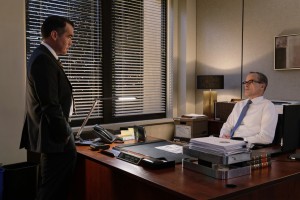
Brian D’Arcy James as Mark Giuliano and Michael Kelly as Andrew McCabe in THE COMEY RULE | ©2020 CBS Television Studios/SHOWTIME/Ben Mark Holzberg
THE COMEY RULE was originally scheduled to run after the November election. Ray sent a letter to the cast and crew mourning this. Did that letter change Showtime’s mind about when to run the miniseries?
Ray answers, “As far as the letter that I wrote, I think it’s lovely and romantic that people think that little old me wrote a letter that backed off a company the size of Viacom [which owns Showtime]. I don’t think that’s actually what happened. I think they knew that the viability of this as a commodity just had so much more value before the election than after the election. They’re in the business of attracting eyeballs, and that was going to happen in September. I think it would have been much less likely to happen in late November. So, I think they were always on their way to reversing that decision. If anything, my letter gave them a little bit of cover so that they could do it more easily, but, no, I don’t think I made Viacom change their minds. I think those people are in the business of making smart decisions, and I’m so grateful that they made this smart decision, because I think it’s going to be good for everybody.
“I don’t think any writer/director has been given the opportunity that I have right now to tell a story as it’s unfolding, to be a part of a national conversation right before a national election. That brings with it enormous responsibility and enormous obligation, but as long as we are being truthful in our storytelling, I feel that we are the match for that.”
The real Comey is 6’8”. Actor Daniels is 6’3.” To play Comey, Daniels says, “I put two‑inch lifts in my shoes, which got me to 6′ 5″. I’m still not 6′ 8″, but I could act the other three inches.”
As far as the rest of the performance, Daniels continues, “When Billy came to me with this, my first thing I said was, ‘Will the network pay for great actors around me? Because I’ve got to have great people around me because I bounce off them. Half of my performance is in the other actor.’ And it’s been the case up and down, all of these people that are here plus the others.”
Daniels also did a lot of research on Comey, although, “I didn’t meet beforehand. I had his book. I had his audio book. I had YouTube. So, I felt I had enough, and I relied on Billy a lot. Billy was my Comey historian, especially in the first two months when I was searching for him. I’ve always said, ‘When I’m done, whatever age that is, I’m going to throw a dinner party, and all the characters I’ve ever played are going to show up.’ I want to see Harry Dunn [from DUMB AND DUMBER] sitting with Will McAvoy [from THE NEWSROOM], and then Jim Comey sits down. They are all alive to me. I knew that I would, yes, one day have to meet Jim Comey, and then he would either like what I did or not. That was a little bit of added pressure, but there was enough pressure just trying to pull off this dramatic character. You approach it the same way you approach anything.”
Ray remembers watching Daniels getting into character. “In the first two or three days that Jeff was working on the shoot, I would hear him in my earphone right before a take, and he would say ‘Ashcroft. Ashcroft. Ashcroft.’ On about Day Three, I came up to him, andI said, “Why the hell do you keep saying “Ashcroft” before every take?’ And he said, ‘Because I was listening to Comey on tape and the only word for sure that I know how to say in his voice is “Ashcroft”.’ So, he was reminding himself of the rhythms of Jim Comey before every take. Very shortly, he said more than just ‘Ashcroft’ in the Jim Comey rhythm.”
Daniels refers to a particular scene as “the loyalty dinner,” where Trump demands personal (and illegal) allegiance from the stunned FBI director. “With Brendan, the posture changed because Trump is just coming at you with this loyalty stuff, and it backed me up. Jim [Comey] was there that day, and he said, ‘You’ve got my posture, the uprightness.’ It was just taking what I was given and using it.”
Ray uses this scene as an example of how Comey’s input helped shape the material. “There were only two people sitting at that table, and I certainly didn’t get any help on that one from Donald Trump. So that had to be input from Director Comey. That was always going to be seen through the lens of when I watch Donald Trump in public‑facing moments. Is his behavior consistent with what Director Comey is saying he [Trump] was saying at the ‘loyalty dinner?’ I found that to be a hundred percent match. There’s nothing in this story that Director Comey has said that Donald Trump said or did that is in any way inconsistent with his behavior and his decision-making in the public square.”
Ray elaborates, “In a shoot like ours, we had fifty-one days to shoot essentially two movies, but just about every day, as our cast can tell you, we shot four or five scenes. The ‘loyalty dinner’ was the only scene in the entire show that had its own day. It was eight-and-a-half pages of dialogue that Jeff and Brendan had to master. But, more importantly, it was Jeff and Brendan’s first day working together, and it was the only day that Jim Comey was on set, there with his daughter. In terms of degree of difficulty for Jeff, it’s the first scene opposite an actor as powerful as Brendan, and the guy you are playing is sitting there at a monitor watching what you do.”
There was also no time for rehearsal or running lines with Gleeson, Daniels adds. “We meet in the makeup trailer when we are both putting on our hair and went in, and the first time we did it was when they rolled camera. I loved that.”
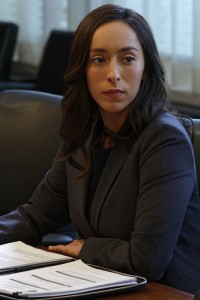
Oona Chaplin as Lisa Page in THE COMEY RULE | ©2020 CBS Television Studios/SHOWTIME/Ben Mark Holzberg
The scenes between Comey and Trump call for Daniels to react with incredulity, yet without making the moment humorous. How did filmmaker and actor tread that fine line?
“This is slightly meta,” Ray replies, “but this is when I would talk to Jeff Daniels the actor about Jim Comey the actor. In other words, Comey is a smart enough guy to know that sitting opposite the President of the United States, it’s probably not a great idea to do an eye role or a spit take, so he needs to maintain an even strain in the face of whatever is coming at him. That is a very, very comfortable zone for Jeff to be in. So, it was a really good fit of actor and character, I felt.”
Daniels says, “It’s moment to moment. It’s what everybody did in the whole movie, and that’s just another one of those moments. Jim had highlighted that in the book when Trump said, ‘I need loyalty,” Jim said that he [Comey] froze. As a reaction, he gave Trump nothing. A guy who’s a prosecuting attorney and an FBI Director, these guys have a pretty good poker face.”
Follow us on Twitter at ASSIGNMENT X
Like us on Facebook at ASSIGNMENT X
Article Source: Assignment X
Article: Interview with writer-director Billy Ray and actors Jeff Daniels, Michael Kelly, Jennifer Ehle, Oona Chaplin and Steven Pasquale on THE COMEY RULE mini-series – Part 1
Related Posts:








